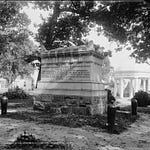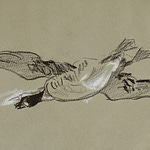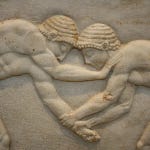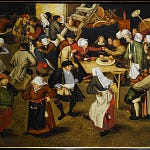The doctor came into the hospital room, where a man not yet in his old age was getting dressed to go home. The doctor was a little nervous.
"Father," he said, "I'm afraid I have bad news."
"Ah, it's as I thought," said the man, tucking a black shirt into black trousers, and adjusting his clerical collar. "Go ahead, my friend, tell me the worst."
"You have cancer of the lungs."
"Thank you," said the man. "How long do I have to live?"
"We can never be sure with cancer," said the doctor, "but the disease is far advanced."
"Still," said the priest, "I'll have time to settle my affairs." He shed a small tear, because he loved this world, and he smiled, because he'd always known he would have to leave it someday. Better to leave it prepared than unprovided. Nor would it be the end, but a beginning. "God seems to use the things we dread," he wrote in his national column, "to draw us closer to him. Since we must die and since death is the entrance into life," he said with the concise reasoning of an old Jesuit, "I am personally glad that cancer, the kindly messenger, came quite a bit in advance. For life seems sweetest when it melts gently into the Life that is our Eternal Promise."
The priest was Daniel Aloysius Lord, author of hundreds of books and pamphlets, immensely popular and not only among Catholics. But he exerted his greatest influence by directing the art of others toward what is good and true and beautiful. What trained him up toward beauty? It was not his formal schooling.
Imagine a small house on the south side of Chicago, in a neighborhood that would be obliterated by railroads in Lord's lifetime. The father, a Protestant, is a small shopkeeper. The mother, a Roman Catholic, is the love of his life. The children have the free run of the city, playing long into the evening in the streets — baseball especially, in all its boy-invented forms. They don't have a lot of money. The father works twelve hours a day, six days a week, for a salary that keeps their heads just bobbing above water. Father Lord later wrote about their way of life with characteristic heartiness. Intellectuals might sneer at the middle class, but he defended them, quoting one of his seminary teachers: "The wholesome, the healthy, the free in heart and the open in mind, the loyal, the honest, the frugal, the idealistic, the gentle, the kind — all these come from the middle class; for them we of the Church must battle. Once they are gone, civilization will yield to the brutality of tyranny; the brute state will take over."
People will say to Father Lord, "Why do you always talk about homes, and not houses?" It is because he never knew a house, but only a home. His mother is the creative power of the home. She cooks with art. She makes sure they have a piano, because how else could you make good music? He and his brother and his father gather around it to sing while she plays. She also reads to her children. Andy Carnegie has not yet lavished millions upon the nation to build public libraries, so people buy their books one by one, or they get them in the literary magazines, where so many novels first appear, in serial form: Scribner's, Harper's, The Strand, and others. From them Mrs. Lord reads to Daniel before he can read to himself.
"I was saturated," he says, "in Greek fable, nursery rhymes, Aesop, the Grimm Brothers, Andersen, and Andrew Lang. How she, without formal education, searched them out and discovered them for us is one of the mysteries and wonders of God's grace. She read me Lamb's Tales from Shakespeare and then swiftly graduated me to listen to her reading of The Merchant of Venice and a hilarious fairy tale called The Taming of the Shrew. The year that Lew Wallace hit the literary bull's-eye with Ben Hur, she read it aloud night after night through one whole winter." Treasure Island, Robinson Crusoe, David Copperfield, Vanity Fair — she read them all, and her children listened.
Good honest hard work, wise frugality, music, centuries of good and great literature to nourish the natural imagination, and the Faith; that was the rich fare that nourished the boy, Daniel Lord.
The year is 1930. An industry is hanging on for life. Father Lord has seen it before. Vaudeville used to provide innocent entertainment for the family. Now it is dead, self-choked. The theater used to thrive all across the country. Then the peddlers of wickedness took it over, and the theater, outside of New York, is dead. The local opera house is no more. Silent movies arrived, and they too began to go sour. "Silent smut had been bad," writes Father Lord. "Vocal smut cried to the censors for vengeance."
He isn't posing as a Jeremiah, crying out to a deaf people. He says what everybody knows. Hollywood is staring bankruptcy in the face. People have organized against the public evil. "Censorship was a very real fact," he writes, "and no Supreme Court of those days dreamed that a city or a state had no right to protect its citizens against moral filth and education to crime." If they might protect people against "rotten tomatoes and embalmed beef and arsenic in the beans and peas," so much the more might they protect families and children from "corrupt and rotten entertainment."
It was shape up or die. So Hollywood turned to the popular Father Lord to write its Production Code, and, four years later, to give it teeth by enforcement — the point man there was one Joseph Breen, a friend of Father Lord. "The films now had a chance to do decent stories," Lord writes, "without having to compete with the salacious and the evil." Virtue liberates and vice enslaves. That is a law of life itself.
Father Lord's code is bold and succinct. No one should leave a theater morally worse than when he entered. The sanctity of the family and the institution of marriage must be honored. Religion must be respected, and religious ceremonies treated with tact and deference. Nudity even in silhouette was forbidden. The obscene, profane, and disgustingly vulgar were also forbidden. "The sympathy of the audience," as Father Lord summed up the code in the end, "should never be thrown to the side of crime, wrongdoing, evil or sin.
What happened was that Hollywood enjoyed its golden age. It wasn't that movies were only for the fusspots of a temperance society. Father Lord was no such. It wasn't that they were for people who had no sense of art. Father Lord had been steeped in art all his life.
It wasn't that the films were made by saints. Far from it — though in fact many of the actors and directors were decent people. But they were a lot closer to Father Lord than we might suppose. They knew hard physical labor. They remembered what it was to kneel in worship. The men knew service in the army. They too had grown up with stories and music. They drew upon the same middle-class and working-class morality that gave strength to Father Lord. They had not been schooled into stupidity. Here is the thing. Because of the Code, the directors had to tell stories. They had no choice. The actors had to learn to suggest more than they said. They had no choice. When every other scene flashes naked flesh, and every other word is coarse, and blood and computer-generated idols abound, and when you can't hear the music for the explosions or the explosions for the music, why do you need a story? The story becomes the scaffold for the corruption — or it just gets in the way. But when you have to tell a story, you may end up telling a great and deeply human story, and people may learn to listen, too.
The proof is in the results, and they came fast. Someday I'd like to teach a course in classic films, and simply call it "1939," for Hollywood's finest year: Gone With the Wind, The Wizard of Oz, Mr. Smith Goes to Washington, Stagecoach, Goodbye Mr. Chips, The Hunchback of Notre Dame — the list goes on and on.
Father Lord died in January, 1955. Late in his life he marveled to see that books by writers like Chesterton and Belloc could be bestsellers, and that the Catholic schools in the United States were splendid and were educating millions, that Catholic hospitals were everywhere, and seminaries were bursting at the seams. He did not live to see the end of the Code, and the quick descent of Hollywood into the pornographic, the expensively inept, and the stupid. He did not live to see the collapse of so many Catholic hospitals, schools, and seminaries.
Maybe we will learn the lesson someday. The world has nothing moral to teach the Church. The Church has much to teach the world, and when the world deigns to listen, the world and the Church both benefit — even in the arts.
The text for this podcast is adapted from "How the Church Has Changed the World: The Good Censor." Magnificat (September, 2019).
Word & Song by Anthony Esolen is an online magazine devoted to reclaiming the good, the beautiful, and the true. We publish six essays each week, on words, classic hymn, poems, films, and popular songs, as well a weekly podcast, alternately Poetry Aloud or Anthony Esolen Speaks. To support this project, please join us as a free or paid subscriber. Learn more about our subscription tiers by clicking the button below.












Share this post